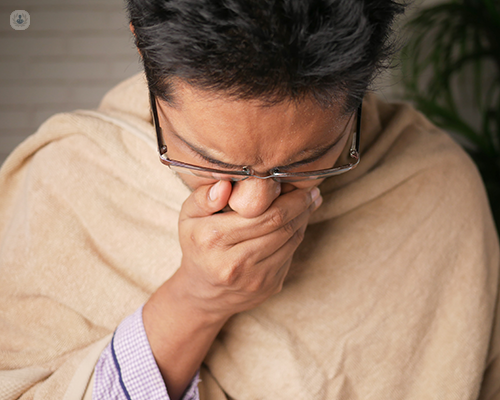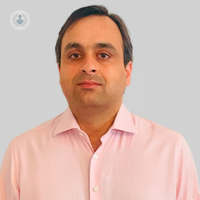Chronic cough: Your FAQs answered
Written by:A chronic cough is defined as a persistent cough that lasts for more than eight weeks. In some people, however, a chronic cough can last for much longer - even years.
Here, Dr Shalin Diwanji, renowned consultant in respiratory and general medicine, provides an expert insight into a chronic cough. The London-based specialist discusses causes, diagnosis and treatment, among other important points.

What can cause a chronic cough?
There are many causes. Some of the most common ones include:
- Smoking
- Postnasal drip
- Asthma
- Acid reflux
- Respiratory infections
- Allergies
- Chronic obstructive pulmonary disease (COPD)
- Certain medications
- Upper airway cough syndrome
- Gastroesophageal reflux disease
Can a chronic cough cause damage to the lungs?
A cough in itself is not dangerous, and is actually a natural reflex of the body. It helps clear the airways and expel irritants agents, such as mucus, from the lungs.
However, if the cough is severe or if it lasts for a long time, some parts of the respiratory system could be harmed.
Persistent, violent coughing may lead to:
- Damage to the blood vessels
- Chest pain
- Muscle pain
- Damaged throat tissue
- Fractured ribs
- A rupture of the diaphragm
- A bloody cough
How is a chronic cough assessed?
The assessment of a chronic cough involves a physical examination and a detailed look at a patient’s medical history. In most patients, a chest radiography is carried out as well.
The most common causes of a chronic cough in adults are upper airway cough syndrome, asthma and gastroesophageal reflux disease, which occur alone or in combination:
- If upper airway cough syndrome is considered, a trial of a decongestant and a first-generation antihistamine may be prescribed.
- The diagnosis of asthma should be confirmed based on response to therapy with inhaled bronchodilators or corticosteroids.
- Patients with a chronic cough and reflux symptoms should start treatment for gastroesophageal reflux disease right away.
Further testing, such as high-resolution computed tomography, may be needed if the cause of a chronic cough is not identified.
How is a chronic cough managed? What treatments are available?
The treatment of a chronic cough depends on its underlying cause.
Some measures that may be helpful in mild cases include:
- Quitting smoking
- Eating a healthy diet
- Getting adequate sleep to increase immunity
- Drinking warm water throughout the day
- Staying away from allergens
Medications used to treat chronic cough may include:
- Antihistamines, corticosteroids, and decongestants for allergies and postnasal drip.
- Inhaled asthma drugs, such as corticosteroids and bronchodilators, for an asthma-related cough.
- Acid blockers or proton pump inhibitors for gastroesophageal reflux disease.
Will a chronic cough ever go away?
A chronic cough can go away once its underlying cause is treated or resolved. If the chronic cough is caused by smoking, then quitting smoking can help the cough go away. If the chronic cough is caused by postnasal drip, asthma, or gastroesophageal reflux disease, then treating these conditions with medication can help the cough go away.
However, if the underlying cause is not treated, the chronic cough may persist.
Dr Shalin Diwanji is an esteemed consultant in respiratory and general medicine with over 15 years’ experience.
If you are living with a chronic cough, do not hesitate to book an appointment with Dr Diwanji via his Top Doctors profile today to receive expert treatment and assessment.


